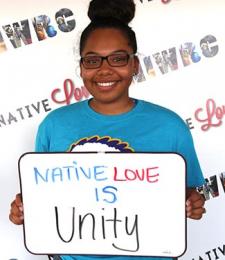How can we create meaningful connections with youth leaders seeking opportunities to become vocal advocates for themselves and their communities?

By Rebecca Balog, NIWRC, with Tanae LeClaire, NativeLove Project Team
"More than ever before, youth-led activism is an important part of the anti-violence movement. As adult advocates, we can expose youth to technical skills and create spaces necessary for them to successfully navigate and impact the anti-violence movement. In turn, youth can mentor adults with their ideas about how they envision overcoming their own challenges, listen to stories shared in their own voices, learn what changes we can make to youth-specific services, and offer insight into how we can successfully engage with youth groups formed to fully reflect and represent their own cultures.
'When we treat each other with respect and value each other, we have the beginnings of ending violence in our communities. Promoting ‘unity’ is how we can accomplish those goals.' - Tanae LeClaire
Youth are ambassadors that represent their own community. As both the future of our movement and experts in their own lived experiences, youth leaders are well-situated to move our work forward. By working with youth collaboratively, we can support the development of peer-to-peer advocacy leadership skills to expand our education and prevention work. Some young people are also great community organizers that can partner with programs to develop new and exciting community outreach activities. The youth leaders in your community are experts in the unique, youth-specific cultural barriers that further marginalize young people who are already at-risk. By engaging with youth leaders, programs can increase visibility and accessibility for youth that are in the margins of the margins in their service communities.
NIWRC talked with Tanae LeClaire, NativeLove Youth Delegate from the Yankton Sioux tribe about important things to remember when planning to develop relationships with youth leaders and planning outreach activities. Are we outreaching effectively? How do youth think we are doing? What can we do better? And what about cross-cultural engagement or culturally specific considerations? Tanae understands that every culture and community has different needs and may make their own recommendations regarding their own group or community. For Tanae, #NativeLoveIs “UNITY” and respecting each other’s cultures."

